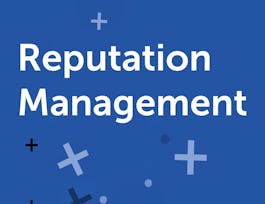What does it mean to be influential? How does one persuade others to pursue a unified goal? How does one leverage power? In this course, you’ll learn how to develop influence and to become more effective in achieving your organizational goals. Professor Cade Massey of the Wharton School has designed this course to help you understand the framework of power and influence and the dynamics of effective networks, and shows you how to develop your skills of persuasion and leverage. By the end of this course, you’ll know your own strengths and how to use them to get what you need, how to gain power and influence, and how to leverage relationships and alliances to achieve your goals in both business and in life.



Influence
This course is part of Achieving Personal and Professional Success Specialization

Instructor: Cade Massey
Sponsored by IEM UEM Group
26,682 already enrolled
(331 reviews)
Skills you'll gain
- Business Management
- Influencing
- Communication
- Organizational Effectiveness
- Strategic Communication
- Business Leadership
- Communication Strategies
- Business Administration
- Initiative and Leadership
- Leadership and Management
- Social Skills
- Business Ethics
- Relationship Building
- Communication Planning
- Governance
- Professional Networking
- Leadership
- Persuasive Communication
- Emotional Intelligence
- Business
Details to know

Add to your LinkedIn profile
See how employees at top companies are mastering in-demand skills

Build your subject-matter expertise
- Learn new concepts from industry experts
- Gain a foundational understanding of a subject or tool
- Develop job-relevant skills with hands-on projects
- Earn a shareable career certificate


Earn a career certificate
Add this credential to your LinkedIn profile, resume, or CV
Share it on social media and in your performance review

There are 4 modules in this course
In this module, we’ll begin by defining influence. You’ll weigh the pros and cons of proactivity and political ability, and find the right balance to get any job done within your organization. You’ll learn different models of power structures and dynamics, and discover the importance of flexibility, situational awareness, and agency. By the end of this module, you’ll be better able to analyze organizational structure, recognize processes within your organization that need improvement, and use your power of influence to optimize these processes.
What's included
14 videos1 reading1 peer review
In this module, you’ll examine social networks and relationships, and learn how they can help you accomplish your organizational goals. You’ll be able to differentiate between dense and disconnected networks, and weigh the benefits and costs of diversification within your networks. Then you’ll learn about both successful strategies and common pitfalls in cultivating a network, and see how authentic generosity will build reciprocity in your networks and vice versa. You’ll also explore coalitions and how alliances between parties with different perspectives can be very effective and efficient in achieving mutual goals. By the end of this module, you’ll learn effective strategies for networking, coalition-building, and leveraging, and will be able to form strong alliances and relationships both inside and outside your organization.
What's included
14 videos1 reading
This module was designed to help you develop your persuasive tactics and rhetoric to increase your influence. By discussing historical examples of classical principles of persuasion—from Aristotle to the six SUCCES factors—you’ll learn what makes ideas memorable and be able to craft effective messages of your own. You’ll assess your own strengths and weaknesses in influence tactics by taking the Leverage Inventory survey. You’ll also explore statistical analysis examining the relative effectiveness of soft, hard, and smart power strategies. By the end of this module, you’ll be able to employ a toolbox of approaches to gain power and influence, and be prepared to bring the right leveraging skills to any situation.
What's included
12 videos2 readings1 peer review
In this module, you’ll examine the ethical implications of persuasion and the responsibilities that come with having a powerful leveraging toolkit. By looking at examples of our own unconscious biases, you’ll gain a better understanding of where your perspective and values stand. You’ll learn how to find the right balance in making the necessary tradeoffs while exerting sustainable influence. Through exploring different hypothetical scenarios in the Hard Questions Survey, you’ll form strategies to avoid common pitfalls while leveraging influence. By the end of this module, you’ll have a deeper understanding of the ethics of persuasion and influence, and be able to make difficult decisions that are more aligned with you and your organization’s values.
What's included
11 videos3 readings
Instructor

Offered by
Why people choose Coursera for their career




Learner reviews
331 reviews
- 5 stars
83.68%
- 4 stars
10.87%
- 3 stars
2.11%
- 2 stars
1.20%
- 1 star
2.11%
Showing 3 of 331
Reviewed on Jul 20, 2020
Such an excellent course! The content is already changing my life. Thank you Professor Cade Massey! You make the lectures interesting!
Reviewed on Nov 24, 2019
Change my point of view regarding in source of communications and added enormous amount of motivation to use provided tools.
Reviewed on Aug 3, 2020
This was an in-depth look at influence with a variety of pertinent examples. Truly felt like I was back in college!
Recommended if you're interested in Business

Duke University

Macquarie University

Queen Mary University of London

Erasmus University Rotterdam

Open new doors with Coursera Plus
Unlimited access to 10,000+ world-class courses, hands-on projects, and job-ready certificate programs - all included in your subscription
Advance your career with an online degree
Earn a degree from world-class universities - 100% online
Join over 3,400 global companies that choose Coursera for Business
Upskill your employees to excel in the digital economy


